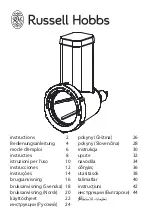
27
Poultry
The weights indicated in the table refer to oven-ready poultry
(without stuffing).
Place whole poultry on the lower wire rack breast-side down.
Turn after
Z
of the specified time.
Turn roasts, such as rolled turkey joint or turkey breast, halfway
through the cooking time. Turn poultry portions after
Z
of the
time.
For duck or goose, pierce the skin on the underside of the
wings. This allows the fat to run out.
Poultry will turn out particularly crispy and brown if you baste it
towards the end of the roasting time with butter, salted water or
orange juice.
If you are grilling directly on the wire rack, you should insert the
baking tray at level 1. The meat juices are collected in the pan
and the oven is kept cleaner.
Fish
Turn the pieces of fish after
Z
of the grilling time.
Whole fish does not have to be turned. Place the whole fish in
the oven in its swimming position with its dorsal fin facing
upwards. Placing half a potato or a small ovenproof container
in the belly of the fish will make it more stable.
If you are grilling directly on the wire rack, you should also
insert the baking tray at level 1. The liquid is then collected,
keeping the oven cleaner.
Tips for roasting and grilling
Poultry
Weight
Accessories and
ovenware
Level
Type of
heating
Temperature
in °C
Cooking time
in minutes
Chicken, whole
1.2 kg
Wire rack
2
4
200-220
60-70
Poulard, whole
1.6 kg
Wire rack
2
4
190-210
80-90
Chicken, halved
500 g each Wire rack
2
4
200-220
40-50
Chicken portions
300 g each Wire rack
3
4
200-220
30-40
Duck, whole
2.0 kg
Wire rack
2
4
170-190
90-100
Goose, whole
3.5-4.0 kg
Wire rack
2
4
160-170
110-130
Small turkey, whole
3.0 kg
Wire rack
2
4
170-190
80-100
Turkey thigh
1.0 kg
Wire rack
2
4
180-200
90-100
Fish
Weight
Accessories and
ovenware
Level
Type of
heating
Temperature
°C, grill setting
Cooking time
in minutes
Fish, whole
300 g each
Wire rack
2
(
3
20-25
1.0 kg
Wire rack
2
4
180-200
45-50
1.5 kg
Wire rack
2
4
170-190
50-60
Fish fillet, 3 cm
Wire rack
3
(
2
20-25
The table does not contain information
for the weight of the joint.
Select the next lowest weight from the instructions and extend the time.
How to tell when the roast is ready.
Use a meat thermometer (available from specialist shops) or carry out a “spoon test”.
Press down on the roast with a spoon. If it feels firm, it is ready. If the spoon can be
pressed in, it needs to be cooked for a little longer.
The roast is too dark and the crackling
is partly burnt.
Check the shelf height and temperature.
The roast looks good but the juices are
burnt.
Next time, use a smaller roasting dish or add more liquid.
The roast looks good but the juices are
too clear and watery.
Next time, use a larger roasting dish and use less liquid.
Steam rises from the roast when basted. This is normal and due to the laws of physics. The majority of the steam escapes through
the steam outlet. It may settle and form condensation on the cooler switch panel or on
the fronts of adjacent units.
Summary of Contents for HX74W.30Y
Page 2: ......






































